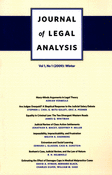-
PDF
- Split View
-
Views
-
Cite
Cite
James Q. Whitman, Equality in Criminal Law: The Two Divergent Western Roads, Journal of Legal Analysis, Volume 1, Issue 1, Winter 2009, Pages 119–165, https://doi.org/10.4159/jla.v1i1.8
Close - Share Icon Share
Abstract
Every western society embraces the ideal of equality before the criminal law. However, as this article observes, that ideal is understood differently in the United States and Continental Europe. American law generally demands that all citizens face an equal threat of punishment, while continental European law generally demands that all citizens face an equal threat of investigation and prosecution. This contrast raises a sharp normative challenge: Is it better to think of equality before the criminal law as pre-conviction equality or post-conviction equality? The article makes the case that pre-conviction of the Continental kind is normatively superior. It then asks why American law has opted for what seems a normatively inferior solution, identifying a variety of factors in American culture and the common law tradition that have encouraged the belief that true equality lies in the equal threat of punishment rather than in the equal threat of prosecution.



